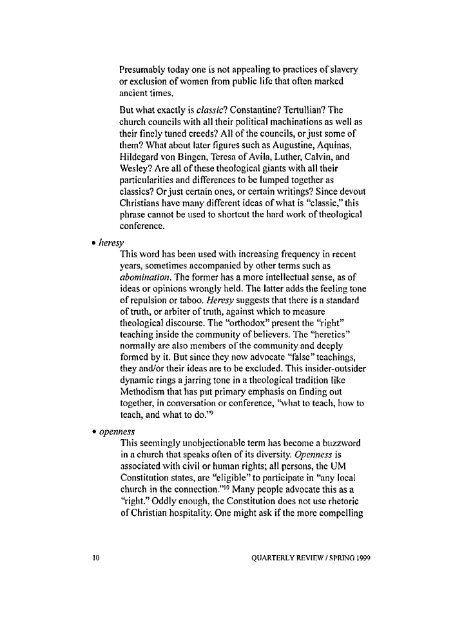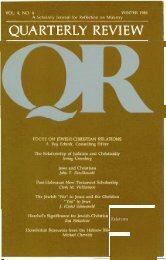Spring 1999 - Quarterly Review
Spring 1999 - Quarterly Review
Spring 1999 - Quarterly Review
Create successful ePaper yourself
Turn your PDF publications into a flip-book with our unique Google optimized e-Paper software.
Presumably today one is not appealing to practices of slaveryor exclusion of women from public life that often markedancient times.But what exactly is classic! Constantine? Tertullian? Thechurch councils with all their political machinations as well astheir finely tuned creeds? All of the councils, or just some ofthem? What about later figures such as Augustine, Aquinas,Hildegard von Bingen, Teresa of Avila, Luther, Calvin, andWesley? Are all of these theological giants with all theirparticularities and differences to be lumped together asclassics? Or just certain ones, or certain writings? Since devoutChristians have many different ideas of what is "classic," thisphrase cannot be used to shortcut the hard work of theologicalconference.• heresyThis word has been used with increasing frequency in recentyears, sometimes accompanied by other terms such asabomination. The former has a more intellectual sense, as ofideas or opinions wrongly held. The latter adds the feeling toneof repulsion or taboo. Heresy suggests that there is a standardof truth, or arbiter of truth, against which to measuretheological discourse. The "orthodox" present the "right"teaching inside the community of believers. The "heretics"normally are also members of the community and deeplyformed by it. But since they now advocate "false" teachings,they and/or their ideas are to be excluded. This insider-outsiderdynamic rings a jarring tone in a theological tradition likeMethodism that has put primary emphasis on finding outtogether, in conversation or conference, "what to teach, how toteach, and what to do." 9• opennessThis seemingly unobjectionable term has become a buzzwordin a church that speaks often of its diversity. Openness isassociated with civil or human rights; all persons, the UMConstitution states, are "eligible" to participate in "any localchurch in the connection " 10Many people advocate this as a"right." Oddly enough, the Constitution does not use rhetoricof Christian hospitality. One might ask if the more compelling10 QUARTERLY REVIEW / SPRING <strong>1999</strong>












